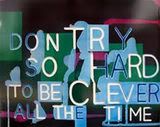 Batman in Dark Times(Spoiler alert: there are no spoilers)
Batman in Dark Times(Spoiler alert: there are no spoilers)Last night I saw
The Dark Knight and I'd like to think I know why it's blowing away all these box office records; I'd like to think it has nothing to do with the mystique of watching a newly-deceased young actor resurrected on the screen for one final performance.
I saw it all-American style: blown-up on the IMAX, larger than life, and with a brewsky in my hand. And I'll admit I needed it, as I tend to get really stressed out during action thrillers and horror films--not scared, mind you, just really stressed out. Many times I will catch myself yelling in hysterics: "can't you run any faster?!" "shit! are you
trying to get killed?!?" --it just makes my blood pressure rise and I inevitably emerge from the darkened theater really nervous and shaky. This time around though, I had the beer, and two of my best friends beside me: Sarah V to my left with her can of Sparks, and Tessa B, with her hands on her ears the entire time (she
can stand the sight of gore and violence, she just doesn't like to listen to it).
So Heath: yes, his performance was fantastic, despite my not wanting to like him in it. I really didn't want to like this demonic version of the Joker because I've always seen Jack Nicholson as the only person in that role--dancin' around to Prince with smoking-hot Vicky Vale runnin' around--that's how I'd like to remember the character and the Batman franchise in general. When Christian Bale came out on the scene I thought, 'what's
American Psycho boy doin' thinking he can replace Michael Keaton?" --I thought he had this really machismo, Steven Segal-esque demeanor that totally turned me off to his version of Batman.
But different times call for different Batmans. In a post-9/11 world, this Batman is referred to as a "vigilante," fighting terrorists and eradicating evil. Although the word "terrorist" is only mentioned twice, the bulk of the action clearly echoes elements of the supposed "War" on Terror, i.e., the bombing of public spaces (the Joker implicitly threatening everyone as a suicide bomber throughout), various forms of torture and abuse, corporate crime, government corruption, surveillance of the citizenry, etc etc. (Speaking of corporate crime, the shots of the tops of skyscrapers in Hong Kong were absolutely breathtaking on the IMAX).
So we know there's going to be a showdown between the Batman and the Joker--no surprise there--but I really appreciated how, as the violence escalates and pressures mount to track down the elusive archenemy--there is this added element of introspection felt on behalf of the caped crusader and thus the audience. Unlike the "War" on Terror, the plight to protect the city of Gotham against the Joker and his henchmen is one of painstaking decision-making where lofty utilitarian ideals are challenged time and again. The rumination of the crusader conflicted by the surplus of collateral damage: what a concept.
And here's this "Joker," a modern-day
Shiva of Hindu myth, seducing the world to total destruction through alluring flights of fancy. Like Shiva, he is "the benevolent herdsman of souls and the wrathful avenger" because his sadistic joy in death and destruction is fueled by an anarchist/nihilist ideology with an underlying ethical agenda. (Okay: spoiler alert) I call it "ethical" because of the dialogue between the Joker and Harvey Dent in the hospital, where he convinces Dent that chaos and chance are more fair and indiscriminate than law and order. He says something about how, when people hear about a gang member or a SOLDIER (emphasis mine) getting killed, they think nothing of it and it is accepted. Yet, when a policeman or a public official gets killed, that's a different story. He doesn't find that fair, and therefore he lives by a code of ethics of sorts whereby indiscriminate, unbridled chaos is the only means of restoring a functioning social structure.
The film also glimmers with allegorical scenarios of our times: when Batman yells at Denton not to kill one of the Joker's henchmen because he is a mental patient (umm..prison industrial complex commentary perhaps? incarceration vs. rehabilitation?) or when Batman has these surveillance-video specs on so that he can see what all the people in Gotham are doing all at once, yet he is trying to battle the Joker who is standing right in front of him (hello? the President's decision to tie up Homeland Security with wiretapping while not focusing on defending us effectively?)
And, although I hate to even go here and over-analyze, or even
dare breach the romantic, flowery illusion of our dear Barack Obama and infer that he is somehow a "two-faced" imperfect pol, does this picture of the Dent character not remind us of the saccharine, platitudinous heart of the Obama campaign?

And with all the cliche Italian mobsters, black street thugs and arms dealers, et al in cahoots with global investment banks and government officials, the scene is set for a more profound message: there is no way to ultimately eradicate evil, just like, in the "War" on Terror, there is no ultimate way to eradicate terror.
There can be no doubt that the comic book-based blockbuster film is the paramount medium from which artists are effectively condemning and critiquing the American Empire and its discontents (fancy that, a medium once targeting hormonal teenage boys with superhero obsessions, now utilized to feed the masses with compelling war and social commentary).
Comic book stories like
V for Vendetta and
Iron Man have been around for decades. Why they are striking a chord with audiences right now, I would hope, has little to do with the explosive, action-packed spectacle or the top Hollywood names involved. I would hope it has everything to do with the much-needed catharsis of the zeitgeist.
 Murakami on Getz
Murakami on Getz
















